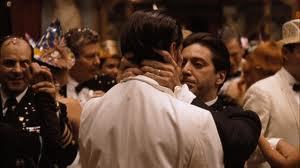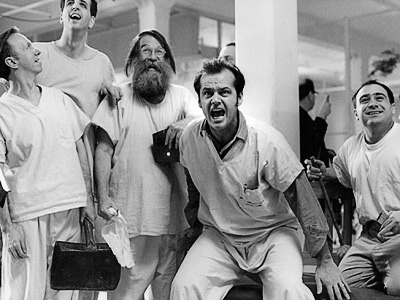Len Gutman's Blog, page 14
November 4, 2012
AFI #31: The Maltese Falcon
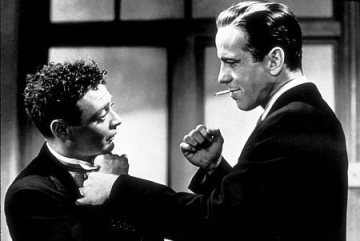 Humphrey Bogart is surely one of the greatest American movie stars — and I say movie star because he’s not much of an actor now is he? He’s the classic case of a guy who plays himself on screen and we love him for that, but acting isn’t his strong suit. He was nominated for an Oscar three times in his long career, but won only once late in his life for The African Queen. The AFI definitely loves Bogart as he is the star of four of the films in the Top 100. I say this because I really don’t think The Maltese Falcon is a great film — but it’s a great vehicle for Bogart and because of Bogart and the rest of the cast the film is considered a classic. And I for one love it.
Humphrey Bogart is surely one of the greatest American movie stars — and I say movie star because he’s not much of an actor now is he? He’s the classic case of a guy who plays himself on screen and we love him for that, but acting isn’t his strong suit. He was nominated for an Oscar three times in his long career, but won only once late in his life for The African Queen. The AFI definitely loves Bogart as he is the star of four of the films in the Top 100. I say this because I really don’t think The Maltese Falcon is a great film — but it’s a great vehicle for Bogart and because of Bogart and the rest of the cast the film is considered a classic. And I for one love it.
The Maltese Falcon has always had a special place in my heart because, and I know this is stupid, but it’s the only film that has a character named Gutman! Sydney Greenstreet is Kasper Gutman, better known as the fat man. I suppose this is common place for you if your name is Smith or Jones, but it’s always been a point of pride for me. But the real reason I love the film is that it’s classic Bogie. As Sam Spade Bogart plays a tough and smart private dick who uncovers a plot to acquire an ancient jeweled bird potentially worth millions. Spade plays his cards close to the vest as the plot advances until the wonderful ending where he nicely wraps up all the details and even sends the beautiful Miss O’Shaughnessey “over” for the murder of his partner. And he closes the film with one of his most classic lines when the detective asks Spade what the bird is — “It’s the stuff that dreams are made of” he says. Classic.
Some other great Bogart lines from the film:
“We didn’t exactly believe your story, Miss O’Shaughnessy. We believed your 200 dollars.”
“I don’t mind a reasonable amount of trouble.”
“When you’re slapped, you’ll take it and like it.”
“Don’t be too sure I’m as crooked as I’m supposed to be.”
I’ve never read the novel so I don’t know if these and the other great lines are thanks to director John Huston or novelist Dashiell Hammett, but either way the film is full of great lines. And it’s also full of wonderful secondary performances by Greenstreet, Peter Lorre and Mary Astor whose over-the-top performance as Miss O’Shaughnessey is priceless.
Next: Apocalypse Now
Filed under: AFI Top 100


October 15, 2012
AFI #32: The Godfather Part II
It’s pretty much impossible to review The Godfather Part II out of context from The Godfather because the stories are so intertwined it’s truly one long film. In fact, as most fans know the films were in fact combined in a later release that told the story chronologically, and some believe this is in fact the best way to view The Godfather story. I won’t go that far, but again I think the stories are so connected it’s not fair to review one without discussing the other.
That being said, I’ll try. I will reserve final judgment about which film I think is better for after I view The Godfather again as part of this quest, but it should be noted that part two comes in at #32 on this list and the original is #2. Having seen both several times I find it hard to disagree, and in fact watching The Godfather Part II again yesterday for this review I was struck by how weird it feels as a standalone film. Part two serves two purposes really — one is to introduce how Vito Corleone got his start in the family business and the other is to witness how Michael Corleone completes his father’s work and ends up bringing the family to the point of both ultimate power and internal demise at once. Michael foreshadows this midway through the film when he asks his mother if it’s possible to help the family while at the same time losing it. Clearly it is.
For me the parts of the film about Michael show how power creates paranoia. Michael becomes so obsessed with trying to figure out who tried to kill him that he eventually blames all of his so-called enemies and brings them all down. At the same time, he brings down his family and at the end he’s left with ultimate power but he’s all alone. This is in contrast to Vito’s quest for power, which we learn from the film comes as a result of circumstances. Vito is witness to the murder of his father, his brother and his mother. By heading off to America he rescues himself from the same fate, but ultimately his circumstances in New York also lead him to crime. I think it’s clear Vito had an innate ability within him to be a criminal, but it isn’t until he loses his job and becomes desperate to provide for his family does he let the criminal out. And we know from part one of the film that Vito is a brutal criminal, but his motivation is always the betterment of the family. Michael did not learn this lesson from his father.
Is The Godfather Part II a great film? I’m not so sure. It’s disjointed and the past vs present elements get confusing. Also, not a whole lot really happens in part two other than Michael wiping out the last of his enemies. The great lines that so many of us men quote are mostly from part one, though there are a few gems in part two (I know it was you, Fredo. You broke my heart. You broke my heart!). But for me the film is much ado about nothing. Again, it’s all part of a great story, but on its own part two doesn’t have as much to offer as part one.
Of course, the Academy didn’t see it that way. It doled out six Oscars including Best Picture (it beat Chinatown, which I think is a better film and if AFI counts for anything it does as well). Robert DeNiro won for Best Actor and Al Pacino, Talia Shire, Lee Strasberg and Michael Gazzo were nominated for acting. Frances Ford Coppola won best director and the film also won Oscars for art direction, music and writing.
The Godfather Part II is a great film, no doubt. But really it’s only great when considered in context of the Godfather saga.
Next Up: The Maltese Falcon
Filed under: General


September 22, 2012
AFI #33: One Flew Over the Cuckoo’s Nest
“I must be crazy to be in a loony bin like this.” — R. P. McMurphy (One Flew Over the Cuckoo’s Nest)
They don’t get much better than this. One Flew Over the Cuckoo’s Nest is a masterpiece of storytelling and a tour de force of acting led by Jack Nicholson in, for my money, his greatest role. Jack won the first of his three Oscars for playing R.P. McMurphy, who ends up getting a little more than he bargained for when he cons his way out of prison and into a mental hospital to escape the hard work in jail. McMurphy is not crazy, but maybe being surrounded by nut jobs rubs off on him. Or maybe trying to act rationally in a mental institution is impossible, because the more McMurphy tries to make things “normal” for his fellow inmates the harder things get inside.
The film is based on the award winning novel by Ken Kesey, and the title of the book and film comes from a children’s poem but essentially means to “transcend the absurdity of man’s earthly existence.” The story is a commentary on oppression and control, specifically control in terms of mental incarceration and what it truly means to be crazy. Of course, the title foreshadows the ending of the film in which (Spoiler Alert) Chief helps McMurphy transcend his earthly existence by killing him out of mercy after he is given a lobotomy. Heady stuff this.
One Flew Over the Cuckoo’s Nest swept the big five Academy Awards in 1976, winning best actor, best actress for Louise Fletcher as the controlling Nurse Ratched, Best screenplay, best director for and of course Best Picture. Forman doesn’t get a lot of credit for being such a great director, but he also won a best director Oscar for Amadeus and directed some wonderful films including The People Vs. Larry Flynt, Ragtime and Man on the Moon. The film is also fun to watch because there are several actors in it who went on to become much more famous, including Christopher Lloyd and Danny DeVito.
I absolutely love One Flew Over the Cuckoo’s Nest and watching it again today was a treat. Jack is classic from the opening scene and that shit-eating grin is one in a million. There are also some very memorable scenes, especially the drunken party on the ward and the boat scene when McMurphy escapes with the gang and takes them on a fishing trip. Of course, there’s the famous line when McMurphy says “I want to watch the god damn World Series,” but like a lot of famous lines (Bogart never said “Play it Again, Sam”) — he never actually said it.
Next Up: The Godfather Part II
Filed under: AFI Top 100, Film


September 15, 2012
AFI #34: Snow White and the Seven Dwarfs
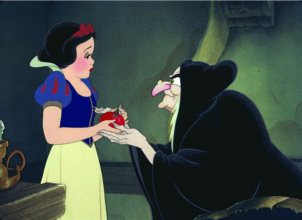 Really AFI? Just because something was the first does not mean it’s the best. Snow White and the Seven Dwarfs is indeed Disney’s first full-length animated feature, but it doesn’t belong on a list of best American films. At No. 34 on the list is it, according to AFI, the best American animated film ever. It was one of only two animated films on the list (Toy Story came in at No. 99). Frankly, I can think of plenty of superior animated films. Does Snow White deserve credit for being the first? Sure. Was it artistic for its day? Absolutely. Does the story have staying power? Yep. Is Disney a marvel of promotion and advertising to kids? Duh.
Really AFI? Just because something was the first does not mean it’s the best. Snow White and the Seven Dwarfs is indeed Disney’s first full-length animated feature, but it doesn’t belong on a list of best American films. At No. 34 on the list is it, according to AFI, the best American animated film ever. It was one of only two animated films on the list (Toy Story came in at No. 99). Frankly, I can think of plenty of superior animated films. Does Snow White deserve credit for being the first? Sure. Was it artistic for its day? Absolutely. Does the story have staying power? Yep. Is Disney a marvel of promotion and advertising to kids? Duh.
Dear Disney fanatics, please don’t yell at me. I like Disney. I know you loved Snow White when you were a little girl and your own daughter now loves Snow White. I get it. I really do. Just don’t try to tell me the film is better than Shrek, or Finding Nemo, or The Lion King, or The Prince of Egypt, or The Little Mermaid, or Ice Age, or Heavy Metal!
Believe me, I can get into a whole analysis of Snow White and we can discuss its impact and we can even get into themes like the Prince Charming fallacy and other feminist stuff. Save it for a different blog. This is about enjoying movies and I fell asleep watching Snow White today. Whistle on that while you work!
Next Up: One Flew Over the Cuckoo’s Nest
Filed under: AFI Top 100, Film


September 8, 2012
AFI #35: Annie Hall
“I feel that life is divided into the horrible and the miserable. That’s the two categories. The horrible are like, I don’t know, terminal cases, you know, and blind people, crippled. I don’t know how they get through life. It’s amazing to me. And the miserable is everyone else. So you should be thankful that you’re miserable, because that’s very lucky, to be miserable.” — Alvy Singer (Annie Hall)
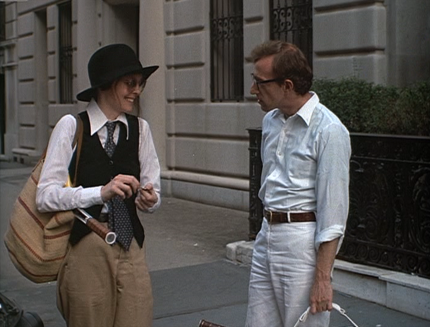 Before we get into my review, we must first get past the elephant in the blog — Annie Hall is my all-time favorite film. I know there are two kinds of people in the world, those who hate Woody Allen and those who love him. I consider Woody Allen to be one of the three or four best directors in the history of film, right up there with Alfred Hitchcock, Marty Scorsese and Spike Lee. If you don’t agree, you’re an idiot.
Before we get into my review, we must first get past the elephant in the blog — Annie Hall is my all-time favorite film. I know there are two kinds of people in the world, those who hate Woody Allen and those who love him. I consider Woody Allen to be one of the three or four best directors in the history of film, right up there with Alfred Hitchcock, Marty Scorsese and Spike Lee. If you don’t agree, you’re an idiot. 
Annie Hall is the perfect romantic comedy and what makes it perfect is that it does not have some sappy unrealistic ending. Instead, it takes the viewer through the roller coaster ride that is love and in the end, at least for Alvy Singer and Annie Hall, that does not mean they end up living happily ever after but rather they learn and grow from their relationship and have a heck of a time along the way. But beyond the realistic look at love and relationships, Annie Hall is brilliant because it is one of the best written films ever. The screenplay is literary perfection, with not a word wasted. Every utterance, every throat clearing, every line is perfectly placed and leads to the next great line. It is, from beginning to end, a masterpiece of the written word. And on top of that, each line is delivered wonderfully by Diane Keaton and Woody Allen and Tony Roberts and the rest of the great cast from Christopher Walken to Shelley Duvall to Paul Simon and everyone in between. Hell, even Jeff Goldblum gets to utter a classic line (his first on film) — “I forgot my mantra.”
Annie Hall was a turning point for Allen, who previously made slapstick films like Bananas and Sleeper. Annie Hall showed Allen’s mature side, and began a string of amazing adult comedies and dramas like Manhattan, Broadway Danny Rose, Radio Days and Hannah and Her Sisters. He hasn’t slowed down and while he’s made a few clunkers he has, like no other, churned out a plethora of great films — he’s currently directing his 48th title. Perhaps the only thing more impressive than his writing and directing career is the parade of amazing actors who have lined up to work on his films. But of all the great actors he has worked with over his career, Diane Keaton remains his best and most loyal muse. Keaton’s performances in Woody’s films are glorious and none is better than Annie Hall herself. Keaton is beautiful and tremendous in the film, which was essentially written for her by Allen (Keaton’s real name is Diane Hall). She took home an Academy Award for best actress for her portrayal, and even sparked a generation of women to dress like her character who was famous for wearing men’s shirts and ties.
“La-di-da, la-di-da, la la.” — Annie
Keaton is the perfect straight man for Allen’s Alvy Singer, easily his most autobiographical character. Alvy Singer is a striking self-analysis by the director. He is obsessed with death, has a difficult time with relationships, is tormented by his upbringing, distrusts everyone, thinks the whole world is anti-Semitic and defends himself with self-deprecating humor. He is not afraid to look at himself with a critical eye, which makes the film incredibly honest and revealing.
“The… the other important joke, for me, is one that’s usually attributed to Groucho Marx; but, I think it appears originally in Freud’s “Wit and Its Relation to the Unconscious,” and it goes like this – I’m paraphrasing – um, “I would never want to belong to any club that would have someone like me for a member.” That’s the key joke of my adult life, in terms of my relationships with women.” — Alvy
I could go on for hours sharing the many wonderful lines in Annie Hall…hell the whole film is one amazing line after another. But you get the point. Annie Hall is a brilliant film and it will always have a special place in my life. The film of course won the Academy Award for best picture in 1978 and Allen (along with co-writer Marshall Brickman) won a best screenplay Oscar. Allen also won for best director, and was even nominated for best actor. I know Allen has had a strange life, especially his tumultuous relationship with Mia Farrow and her adopted daughter Soon Yi (with whom he has been married since 1997). Is that weird? Yes. Is it illegal? No. Is it immoral? Perhaps. Still, his personal life aside Woody Allen is and always will be one of the world’s greatest filmmakers. And Annie Hall is his masterpiece.
Next Up: Snow White and the Seven Dwarfs
Filed under: AFI Top 100, Film


August 26, 2012
AFI #36: The Bridge on the River Kwai
“Madness! Madness!” — Major Clipton
OK, now we’re starting to get into the great ones! The Bridge on the River Kwai is a tremendous film that took home multiple Academy Awards in 1958 and set a standard for hundreds of anti-war films to come. The film is based on the novel by Pierre Boulle and tells the story of a company of British prisoners of war during World War II who are forced to build a bridge by a Japanese Colonel who has some unique ways of motivating his prisoners. The prisoners are led by the overly proper Colonel Nicholson who at first inspires his charges by not giving into Colonel Saito’s demands, then further inspires his troops to build a bridge that will stand the test of time and serve to honor the spirit and work ethic of the Brits. Unbeknownst to Nicholson, the Allies are planning to blow up the bridge as soon as it’s complete.
There are so many great aspects of this film it’s hard to know where to begin, but I will begin with what I think is one of the main themes of the film — the futility of war. Major Shears, played by William Holden, sets the tone early on by questioning Nicholson’s motives when he first arrives at the camp, and then later in the film when he returns to help blow up the bridge he tells his commander:
“You make me sick with your heroics! There’s a stench of death about you. You carry it in your pack like the plague. Explosives and L-pills – they go well together, don’t they? And with you it’s just one thing or the other: destroy a bridge or destroy yourself. This is just a game, this war! You and Colonel Nicholson, you’re two of a kind, crazy with courage. For what? How to die like a gentleman… how to die by the rules – when the only important thing is how to live like a human being.”
The bridge itself is a metaphor for the irrationality of war. The prisoners are there to build the bridge and they build a great bridge, only to have it destroyed as soon as it’s complete. In other words, what was the point? Major Clipton says it in the quote above when he watches the bridge crumble and sees the death all around him.
Another theme of the film is courage. Saito and Nicholson have different definitions of courage, and Saito thinks the British have none. But Nicholson believes courage comes from doing what is right in the face of adversity and he literally proves his point by challenging Saito at the risk of death. Saito learns to understand Nicholson’s courage and finally gives in and in return Nicholson rewards Saito by building a wonderful bridge. Saito and Nicholson are equally stubborn, but to what end as Major Clipton reminds us.
The Bridge on the River Kwai also delivers several spectacular acting performances, especially by Alec Guiness as Nicholson and Sessue Hayakawa as Saito. Guiness was rewarded for his work with a Best Acting Oscar and Hayakawa was nominated for Best Supporting Actor. It was Sir Alec’s only Oscar win over a tremendous acting career and one of the best performances you’ll ever witness. The film also won Best Picture and five additional Oscars.
Next Up: #35 Annie Hall (my all-time favorite movie!)
Filed under: AFI Top 100


August 15, 2012
A Life Full of Live Music
It poured last night in Phoenix and this morning my son Connor had an ear worm — he couldn’t get Rain in the Summertime by The Alarm out of his head. Why a 14-year-old kid even knows about The Alarm is a story for another day, but when he mentioned it I told him I saw The Alarm in concert in 1984 when they opened for The Pretenders at the California Theater in San Diego (remember that show Zac Shess?). This led Connor to remark: “You’ve been to a lot of concerts. Like 20,” he said. Well, more like 100 I replied. When he mentioned I was lucky to have seen so many cool 80s bands, I told him I was fortunate to live in places like San Diego and the San Francisco Bay Area where great bands performed. I’ve lived in Phoenix for 18 years now and a lot of lesser known bands skip the desert when they tour.
I started thinking about how many live shows I’ve seen over the years and I thought it might be fun to try to list them all. It’s probably nowhere near 100 and it’s probably not all that impressive a list compared to some. I’m sure I’m missing some. Nevertheless, in no particular order:
The Kinks (my first real concert. 1979. San Diego Sports Arena)
The Who
John Cougar
Loverboy
Rush
Simon & Garfunkel
Adam Ant
Duran Duran
Mojo Nixon and Skid Roper
The Beautiful South (2)
Ben Folds
Counting Crows (2)
Maroon 5
Depeche Mode
Morrissey
Erasure
Everything But the Girl (2)
Gorillaz
Howard Jones
Joe Jackson (3)
Little River Band (2)
Jack Johnson
John Legend
Midge Ure
Mike Doughty
Crowded House
Ziggy Marley
Peter Gabriel
Inner Circle
Sinead O’Connor
Paul Weller
Peter Case
R.E.M.
Tori Amos
Indigo Girls (2)
The Untouchables (2)
X
Stan Ridgway
Steely Dan
Tears For Fears (3)
The B-52s
Sun 60
The Cranberries
Berlin
The Gap Band
Sparks
Madness (2)
Oingo Boingo (2)
The Police (2)
Billy Joel (2)
Squeeze (2)
The Hooters
Jill Sobule
Edie Brickell and New Bohemians
The Pretenders
The Alarm
The Beach Boys
Coldplay
G Love and Special Sauce
Zee Avi
Spyro Gyra
Chris Isaak (2)
Seal
U2 (3)
10,000 Maniacs
English Beat
Sara Hickman
Deborah Harry
Red Rockers
NRBQ
KC & The Sunshine Band
What about you? Are you a big concert goer? What are some of the best shows you’ve seen over the years?
Filed under: Music


August 5, 2012
AFI #37: The Best Years of Our Lives
 World War II had barely ended when director William Wyler made and released The Best Years of Our Lives, the poignant story of three WWII veterans returning home to small town America to try to re-assimilate back to their previous lives. In the past 40 years or so we’ve seen some similar films, like Coming Home about the Vietnam War and Brothers about Iraq. Those and similar films owe a lot to The Best Years of Our Lives.
World War II had barely ended when director William Wyler made and released The Best Years of Our Lives, the poignant story of three WWII veterans returning home to small town America to try to re-assimilate back to their previous lives. In the past 40 years or so we’ve seen some similar films, like Coming Home about the Vietnam War and Brothers about Iraq. Those and similar films owe a lot to The Best Years of Our Lives.
The Best Years of Our Lives is a terrific drama that explores the post war experience, family dynamics, friendship and love. Al Stephenson (played by Fredric March) returns from the Army to his grown kids and his old executive job at a bank. He is torn between his career and his loyalty to other returning vets looking to get back on their feet. Fred Derry (played by Dana Andrews) is an Air Force bombardier who married a woman he barely knew just before he went off to war and returns home to a wife he barely knows and a very difficult job market for a man of his limited skills. To complicate things, he meets Al’s daughter Peggy and falls in love with her. Then there is Homer, played by Harold Russell, a Navy man who lost both of his hands when his ship was sunk and is unsure how his high school sweetheart fiance will receive him upon his return.
This is heavy stuff for sure, and it is so well written and acted that even at nearly three hours it holds your attention because you truly want to see how things end up for these heroes. The film took home a ton of Oscars in 1947, none more deserving than the Best Supporting Actor nod for Russell who actually did lose his hands while in the service (although not in the war but rather in an accident). Still, his hooks are part of his character and you can tell he brings his own experience to the role. Russell is actually the only person to win two Oscars for the same role since he was also given an honorary award for “bringing hope and courage to his fellow veterans through his appearance in The Best Years of Our Lives.” March won a Best Actor Oscar for playing Al, Wyler won for Best Director and of course the film won a well deserved Oscar for Best Picture.
The Best Years of Our Lives is a film that shows us what the medium can truly achieve in terms of bringing issues to the screen and telling the story of the human condition. Great stuff.
Next Up: The Bridge on the River Kwai
Filed under: AFI Top 100


July 23, 2012
AFI #38: The Treasure of the Sierra Madre
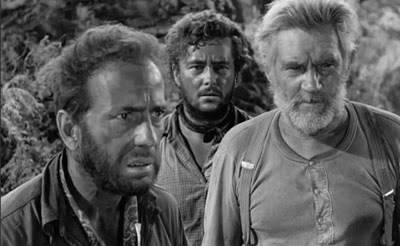 It’s funny to me that such a great Western with so many memorable moments and themes is best remembered for a line that really was just a throw in to the plot. But you remember the line, even if you think it’s from Blazing Saddles. “Badges? We don’t need no badges. We don’t have to show you any stinking badges!“
It’s funny to me that such a great Western with so many memorable moments and themes is best remembered for a line that really was just a throw in to the plot. But you remember the line, even if you think it’s from Blazing Saddles. “Badges? We don’t need no badges. We don’t have to show you any stinking badges!“
The Treasure of the Sierra Madre is a great Western, even though it takes place on Mexico which isn’t exactly Texas. It’s a story as old as time with a theme around what greed can do to a man when he’s desperate. Ironically it’s the same theme of director John Huston’s first great film, The Maltese Falcon. Like the famous Bogart line in that film, when Bogie is asked what the falcon is and he replies “It’s the stuff that dreams are made of.” So too is gold, the stuff that dreams are made of in The Treasure of the Sierra Madre. It’s the story of down and out Fred C. Dobbs, who finds himself in Mexico scraping by on borrowed pesos. When Dobbs meets Curtin, another American in the same situation, the two uncover a “dream” in a tale of gold told by old timer Howard. Together the threesome set off on an ill-fated adventure to dig for gold in the Mexican mountains where they fight bandits and fight each other for control of the stake.
But really the theme of Treasure is greed, and how different men react to the potential for riches. Howard and Curtin seem to have a good attitude about the strike, happy to take enough out of the ground to ride off rich. But Dobbs wants more, and then his mind starts to run away from him with bouts of paranoia and fear that ultimately lead to his demise. Humphrey Bogart plays Dobbs and he’s a nasty little bugger who is definitely hard to like. While Curtin and Howard seem like decent guys, Dobbs thinks the world is out to get him and at the same time he deserves the riches coming to him. It’s a different role for Bogart, playing the loser if you will. Dobbs is pretty much the opposite of Casablanca’s Rick Blaine. It says a lot about his acting abilities frankly…the viewer really doesn’t like Dobbs!
Treasure is really Walter Huston’s masterpiece though. He won a Best Supporting Actor Oscar for his portrayal of Howard, who is a little bit crazy but just sane enough to keep things honest, have a good perspective and stay alive. He also seems to understand the power that riches can bring and the trouble that greed can bring, likely because he’s experienced it all before. The old timer steals the film and is as lovable a character as you’ll find in a film. Huston is an under the radar actor who was nominated for three other Best Actor Oscars! But Howard is his triumph and a role for history. Kudos as well to the great Director John Huston, who delivered so many great films over his career.
Treasure is one of seven “Westerns” on the AFI list and only The Searchers and High Noon come in higher on the list. That being said, Butch Cassidy and the Sundance Kid is the best Western ever in my book. The Treasure of the Sierra Madre definitely belongs among the greats.
Next: The Best Years of Our Lives
Filed under: AFI Top 100


July 21, 2012
AFI #39: Dr. Strangelove or: How I Learned to Stop Worrying and Love the Bomb
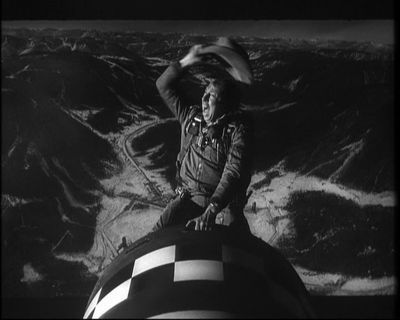 I’m about to piss off some movie fans, so here goes: Dr. Strangelove is terribly overrated! It’s 95 minutes of unintelligible silliness with a handful of comic gems sprinkled in. It’s certainly not the greatest black comedy of all time and it definitely does not belong on the AFI list of best films ever. There. I said it!
I’m about to piss off some movie fans, so here goes: Dr. Strangelove is terribly overrated! It’s 95 minutes of unintelligible silliness with a handful of comic gems sprinkled in. It’s certainly not the greatest black comedy of all time and it definitely does not belong on the AFI list of best films ever. There. I said it!
I certainly like the theme of the film. If you’ve never seen it, basically it’s about what would happen if a rogue general launched a nuclear sneak attack on the Soviet Union (circa 1964) as the cold war is in full swing. And it’s “dark” because it is both comic and all does not end well for planet earth. It must have caused quite a stir in 1964. But for me it was ultimately disappointing. That being said, here are some things I liked:
Peter Sellers is very fun in three roles. As the president of the United States, his discussions with the Russian president over the phone from the war room are very funny. But as Dr. Strangelove himself it’s really just a one gag role in the way he tries to hide his Nazi past. Funny, for a minute or so.
George C. Scott’s red-hating general is very funny in a Fox News conservative kind of over-the-top way.
Slim Pickens riding the bomb into oblivion like a bucking bronco is the most memorable scene in the film.
One great line: “You can’t fight in here…this is the war room!”
Dr. Strangelove suffers from what many of the films on this list suffer from — memory tricks. We remember the film being so great because we remember the highlights but forget about the entire film. Ask anyone about Dr. Strangelove and they’ll surely recall the Slim Pickens bomb scene or Dr. Strangelove trying not to give the Nazi salute. But beyond those “gags” there is very little in the film which provides genuine laughter. I mean it. See it again if you don’t believe me.
A word about director Stanley Kubrick. He is easily the most overrated film director of all time. In my opinion he made four solid films: A Clockwork Orange, The Shining, Spartacus and Full Metal Jacket. The rest are overrated or flat out suck.
Next: The Treasure of the Sierra Madre.
Filed under: AFI Top 100



